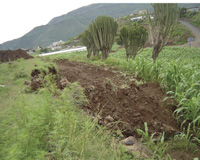
Election-oriented projects damaging agricultural lands [Archives:2006/970/Reportage]
August 7 2006
 |
During the summer, coinciding with election season in Yemen, each and every party tries to pull Yemeni citizen to its side. According to their electoral campaigns, each party claims to provide the necessary services the citizens need.
Agricultural land is the sole witness to the validity or invalidity of these projects, as well as their simultaneity. Such land also will be a witness to those publicity projects coming at the cost of citizens and their crops, having reached their mid-life by now after months of effort exerted by farmers in caring for them. Here comes election season, accompanied by road building, having been postponed like other projects, to be done by this time.
Construction of a new road linking Al-Sahul Wadi in the south to Shaban in the north began two weeks ago and was catastrophic for farmers and their lands because the new road crossed most of these lands, wiping out plants.
Jibla district's Al-Dihithath area is one such area whose lands were spoiled by wheel loaders and bulldozers, particularly in the east. Locals who have spent months caring for their crops and watering them from their sweat before the rains came were sad to see them washed away before their eyes and their objections and appeals were not heard. Appealing in vain, they found nothing but bulldozers and military patrols, which do not understand what such action means to poor locals whose agricultural lands were torn in front of their eyes. These poor locals were having nothing to do except cry.
According to some locals, the matter would be different if the road was constructed at a different time than this, as they are close to harvesting time. Roads are made in the winter when there are no crops. Moreover, according to them, the road plan was approved long ago and wasn't to pass through their lands, as they knew from Iraqi engineers who used to come to the area frequently.
The road would have taken its planned route, if not faced with influential individual interests, who found it to be destroying to their lands. Benefiting from their influence, they lobbied to convince governorate leadership, the local council and engineers to make a different plan, thus saving their lands and turning to poor locals' agricultural lands. The road wasn't confined only to these locals' lands, but also included their houses.
Ahmed Al-Shahithi, who came to Al-Dihithath from Al-Mahwit years ago seeking work to support his 13-member family, used to go from one market to another selling sesame. He was able to build a small cottage-like house after being given a small portion of land by one of the locals.
Under the pretext of firing into the air and blocking the way of bulldozers that were approaching his home, Al-Shahithi was taken by force to spend three days in the criminal investigation bureau prison in Ibb and his family knew not where he was.
When Col. Ameen Al-Warafi, secretary-general of the governorate's local councils, came to visit the new road, Al-Shahithi's family met with him, requesting that he free their only supporter and keep their house. According to Al-Shahithi's wife and his mother, Al-Warafi promised to free Al-Shahithi and compensate them for their house.
However, they declared that they will not accept compensation because the most beautiful place in the world wouldn't be like theirs; and furthermore, they'll do anything and everything to defend their house.
Via the Yemen Times, Al-Shahithi's family appeals to human rights organizations in Yemen and concerned authorities to defend their house against the aimed destruction. Additionally, they allege that such abuses are directed at the poor and assured that all family members will defend their house by all possible means and they will refuse any compensation.
——
[archive-e:970-v:14-y:2006-d:2006-08-07-p:report]


